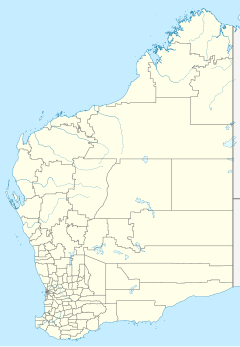Peron Peninsula

Peron Peninsula (Malgana: Wulybidi)[1][full citation needed] is a long narrow peninsula located in the Shark Bay World Heritage site in Western Australia, at about 25°51′S 113°30′E / 25.850°S 113.500°E. It is some 130 kilometres (81 mi) long, running north-northwesterly, located east of Henri Freycinet Harbour and west of Havre Hamelin and Faure Island. It is the largest of the Shark Bay peninsulas. Significant settlements include Denham and Monkey Mia. Shark Bay Airport is located there. It is the location of former Pastoral leases Peron and Nanga stations, and is the main location of land access to points within the World Heritage site. The northern area contains the Francois Peron National Park. It is surrounded by the Shark Bay Marine Park and its lower southeast part is adjacent to the Hamelin Pool Marine Nature Reserve.
The Taillefer Isthmus, the narrowest section of the peninsula, is between Nanga and Goulet Bluff – which has Shell Beach located on the eastern side which lies in the L'Haridon Bight.
The northernmost point is Cape Peron, which is a namesake of Cape Peron in the metropolitan Perth coastal area.
History
[edit]The peninsula is named for French naturalist François Péron, who visited the area with the Geographe expeditions of 1801 and 1803.[2] The peninsula was used as a sheep station from the late 1880s until being purchased by the national government in 1990. In 1919 Peron Peninsula Station had a total area of 106,000 hectares (263,000 acres) divided into 25 paddocks and was stocked with 12,000 sheep.[3]
Peron Homestead Artesian Bore
[edit]The Peron Historical Homestead is near Denham.[4][5][6]
It includes a visitor center. Peron Peninsula is part of the Carnarvon Basin, a geological structure lacking permanent fresh surface water. During the 1900s artesian bores were sunk to provide a greater quantity and quality of water. The resulting water comes up hot (35–60 °C or 95–140 °F) and has high salt and mineral content.[7][full citation needed]
References
[edit]- ^ "Aboriginal Languages".
- ^ "Shire of Shark Bay - National Parks". Archived from the original on 21 September 2009. Retrieved 14 December 2009. Australia Tourism website, accessed 14 December 2009
- ^ "Advertising". Western Mail. Perth, Western Australia: National Library of Australia. 13 November 1919. p. 14. Retrieved 28 April 2014.
- ^ Western Australia. Department of Conservation and Land Management; Suba, Tanya (1995), Heritage assessment of the Peron Homestead and station precinct in the Francois Peron National Park, Shark Bay World Heritage Area, The Author, retrieved 24 October 2024
- ^ Gostelow, Philip (2017), Peron Homestead shearing shed, shearers quarters, cook house and mess hall, 5 January 2017, retrieved 24 October 2024
- ^ Jones, Daryl (2012), Aerial photographs of Peron Homestead, 16 April 2012, retrieved 24 October 2024
- ^ Tourism website
Further reading
[edit]- (1830) Account of Peron's Peninsula, in Shark's Bay, Western Australia : with remarks on its capabilities and fitness to receive a small fishing settlement : compiled from various sources by a gentleman in the service of the Hon. East India Company. From the Edinburgh Journal of Natural and Geographical Science, Vol. II, 1830, pp. 249–257.
(available as a photocopy at Battye Library)
- Thomson, Carolyn (1997) Discovering Shark Bay Marine Park and Monkey Mia Como, W.A. Department of Conservation and Land Management. ISBN 0-7309-6854-5 page 52 for aspects of Cape Peron


